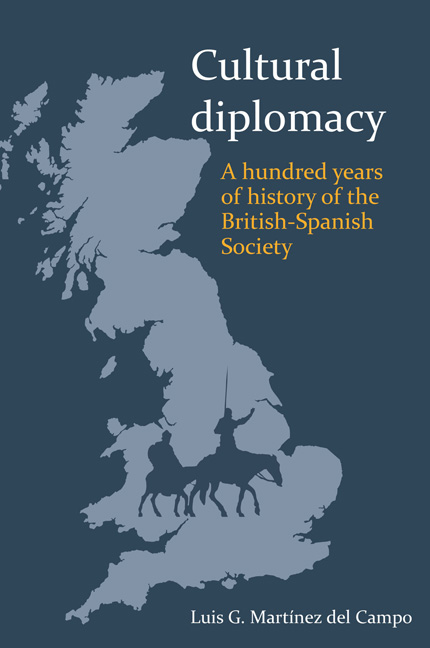Book contents
- Frontmatter
- Contents
- Joint Foreword
- Prologue
- English Edition
- Acknowledgements
- 1 Introduction
- 2 The foundation and expansion of the Anglo-Spanish Society (1916–1920)
- 3 The Anglo-Spanish Society in the interwar period
- 4 The rebirth: The League of Friendship (1950–1958)
- 5 A return to the origins: The new Anglo-Spanish Society
- 6 The Anglo-Spanish Society and Spanish democracy
- 7 Epilogue
- 8 Appendix: Memories of a retired member of the Executive Council of the Society by John Scanlan
- VERSIÓN EN ESPAÑOL
- Nota del autor
- 1 Introducción
- 2 Nacimiento y expansión de la Anglo-Spanish Society (1916–1920)
- 3 La Anglo-Spanish Society en el periodo de entreguerras
- 4 La reorganización: La Liga de la Amistad (1950–1958)
- 5 De vuelta a su origen: La nueva Anglo-Spanish Society
- 6 La Anglo-Spanish Society y la democracia
- 7 Epílogo
- 8 Apéndice: Cuadro de Cargos
- Index – English
- Index – Spanish
Prologue
- Frontmatter
- Contents
- Joint Foreword
- Prologue
- English Edition
- Acknowledgements
- 1 Introduction
- 2 The foundation and expansion of the Anglo-Spanish Society (1916–1920)
- 3 The Anglo-Spanish Society in the interwar period
- 4 The rebirth: The League of Friendship (1950–1958)
- 5 A return to the origins: The new Anglo-Spanish Society
- 6 The Anglo-Spanish Society and Spanish democracy
- 7 Epilogue
- 8 Appendix: Memories of a retired member of the Executive Council of the Society by John Scanlan
- VERSIÓN EN ESPAÑOL
- Nota del autor
- 1 Introducción
- 2 Nacimiento y expansión de la Anglo-Spanish Society (1916–1920)
- 3 La Anglo-Spanish Society en el periodo de entreguerras
- 4 La reorganización: La Liga de la Amistad (1950–1958)
- 5 De vuelta a su origen: La nueva Anglo-Spanish Society
- 6 La Anglo-Spanish Society y la democracia
- 7 Epílogo
- 8 Apéndice: Cuadro de Cargos
- Index – English
- Index – Spanish
Summary
This carefully researched and meticulous study by Luis G. Martínez del Campo of a hundred years of the British Spanish Society is interesting on many levels.
First, the vissicitudes through which the Society passed during the 20th century – including re-branding, winding up, and then re-branding again – is a good reflection of the turmoil experienced in Europe (and indeed the wider world) during that century.
Secondly, the seemingly anecdotal inspiration that lay behind the foundation of the Society – namely the coincidence of the 3rd centenary of the deaths of William Shakespeare and Miguel de Cervantes – goes to the heart of what the British Spanish Society has been, and is, about. Namely, the cultural baggage that our two countries have accumulated over the years.
Familiar names spring up again and again. Byron, George Borrow, Richard Ford, Unamuno, Dámaso Alonso, Gregorio Marañón – to mention a few figures from the past. Nor will it have escaped notice that some of the most prestigeous contemporary writers on Spain are British – Hugh Thomas, Gerald Brennan, Paul Preston, again to mention but a few.
The fact is that Britain and Spain led the two greatest Empires of the modern era. And perhaps the most important inheritance of all that is that our two languages are now the two most widely spoken languages in the free world.
And it seems to me that the real challenge for the British Spanish Society going forward lies precisely in this area.
It is now the case that English is established as the universal language. As a Brit I am both pleased and proud of that. But equally I am very aware that language carries with it a whole package of cultural values and attitudes. So, unless we want to live in a mono-cultural world, we have a duty to promote both the Spanish language and the cultural values it brings, as they are the only ones that can offer an appropriate counter-poise to an Anglo dominated world.
Hopefully this History of the first 100 years of the British Spanish Society will inspire its members to take up that challenge.
- Type
- Chapter
- Information
- Cultural DiplomacyA Hundred Years of the British-Spanish Society, pp. ix - xPublisher: Liverpool University PressPrint publication year: 2015



